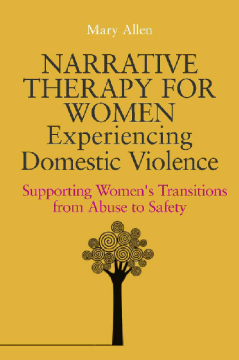
Additional Information
Book Details
Abstract
For women experiencing domestic violence, narrative therapy can be a powerful tool to help them gain self-confidence and a sense of identity, resist violence, and make the transition from abuse to safety.
Drawing on the narratives of women who have experienced domestic violence, this book explores how women employ strategies of resistance, and how strengthening their sense of identity can contribute to this resistance. It demonstrates how narrative therapy can be used as an effective intervention, helping women to leave abusive relationships and supporting them in moving on. The author outlines a model for intervention and discusses how to work with women whilst keeping their safety in mind.
This book will be invaluable to counsellors, social workers and others working with abused women, helping them to understand, engage with and fully support women to resist and move on from abuse.
Mary Allen was Lecturer in Social Work, University College Dublin, Ireland, and Chair of Women's Aid, Ireland. Her primary research interest lay in Intimate Partner Violence, and she worked and carried out research in Ireland, Africa and South America.
This accessible and innovative text provides an invaluable insight for practitioners working with abused women... Handles the authorship with the sensitivity and empathy that the topic of domestic abuse requires... In addition I feel that this book provides academia with a more holistic understanding of the often complex and contradictory trajectories that women take upon leaving abusive relationships as understood by the women on a practical level but also in relation to their conceptualisation of "self"... this book is a must read for practitioners working in the field of domestic abuse... Allen's accessible writing style lends itself easily to multiple audiences including academics and students as the book is held together by empirically robust research that sheds light on both the practical and emotional issues surrounding survivors of domestic abuse and their journey of survival... a noteworthy book that is well-written and welcome addition to the ever expanding literature on how to support women following domestic abuse.
British Journal of Community Justice
